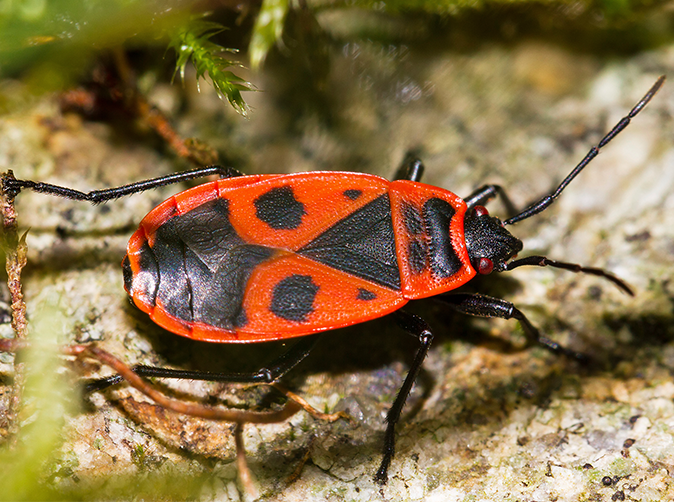Common Late Fall Insect Pests to Watch For

Most of the time, we associate pest problems with summer. While summer is definitely the time of year when most pest infestations happen, they can pop up any time of year, even in the winter.
This is usually because they start forcing their way into our homes during the fall months.
Have you seen pests in your home during the fall? Name three bugs that bug you in the fall. Were springtails, box elder bugs, or stink bugs on your list? If so, it isn’t surprising.
These are common pests in late fall because they hide from the cold as winter approaches and hunker down until warmer weather returns.
This process is called overwintering. And it can sometimes cause bugs to get into our homes.
Springtails
It can be disconcerting to find hundreds of tiny, springing pests in your basement or, worse, in one of the common areas of your home.
It can make you think you have a flea infestation, and those are definitely no fun to deal with.
But a springtail infestation isn’t anywhere near as bad as flea infestation. Springtails won’t bite you and they won’t make you sick.

They feed on algae, fungi, mold, and mildew, not blood. But they can become a nuisance when they congregate in your bathroom or some other room with high humidity.
When springtails appear in a home, they can be a warning sign of water damage.
If this is a common fall pest for you, it is definitely time to call a handyman and have your home checked for any damage that may be letting moisture into your walls.
Sealing those holes will prevent that water damage from continuing, and it will help you keep more heat in your home during the winter months.
Box Elder Bugs
Have you seen black and orange, oval-shaped bugs grouping up on your exterior walls? Have you seen them crawling on your deck and clinging to your screens? Do they find their way inside and crawl around in your curtains and cling to walls?
Then we don’t have to tell you how irritating box elder bugs are.

Fortunately, they are not known to spread diseases to people and they rarely bite. The biggest issue you’ll have with these insects is that they can stain your belongings with their fecal matter and they can produce an unpleasant odor.
Stink Bugs
When these brown-colored, shield-shaped bugs get in, it stinks. Just like those box elder bugs, they’ll crawl in your curtains and cling to your walls.

They’ll also perch on your light fixtures and sometimes dive bomb you as you pass by. Worst of all, they make a bad smell if they are stepped on or disturbed. This smell is what inspired their name.
The Solution For Overwintering Pests
Before these bugs get in, it is important to take measures to keep them out. Here are a few ways to get that done:
⭐ Do a detailed inspection of your foundation walls and repair any gaps or cracks you find.
⭐ Inspect around your door and identify any gaps. Fix or replace weather stripping to allow the door to seal properly. If your door is ajar, it may need to be adjusted so that it makes a solid contact all the way around.
⭐ Replace or repair damaged screens. When you do, inspect the interior of your window frames for holes created by other bugs. Overwintering pests will exploit entry points made by wood-damaging pests such as carpenter ants, termites, and rodents.
⭐ Examine your exterior walls, especially around windows, and seal any holes you find. Your screens aren’t the only place you can have entry points. Sometimes holes and gaps can form in screen frames. These can be patched with some tape for a temporary fix.
⭐ Be aware that overwintering pests can get into your eaves, soffits, roofline, vents, exhaust, chimney, and other entry points that are high on your home. They’ll also get into holes created by squirrels, rats, bats, and other wildlife. Do an inspection of your roof if possible.
Why Fall Pest Control Is So Important
I’m sure you are aware of the problems pests can create for you and your family.
We all have some kind of bug that plagues us, and most of us have dealt with rodents in our walls, especially those of us who have an older home.
But to understand why fall pest control is so important, you first have to look at the problem. And it’s icky.
Termites and ants are the home wreckers. Literally. They breach your home’s defenses and build colonies in your walls.
Those colonies feed and burrow into your wood, making vast pathways through support beams and framing. Many homeowners don’t even see the destruction till it’s too late, and they are looking at thousands of dollars of repairs–if they can repair at all.
Rodents get into your walls and chew on wires, and nibble on sheet rock.
So, besides being a nasty, hairy, disease carrier, that crawls through your food drawers, they can also create problems with your electric, phone, internet, and television wiring.
These are hard to track down problems hidden in your walls, and can cost a lot to fix. If you’ve ever paid an electrician to do anything, you know they’re not cheap.
Fall invaders also bring viruses and disease. The not so lovable cockroach loves bacteria and decay.
When he is done dragging his shiny brown body through the sewer pipe, he is happy to crawl into your flour bag, or over the silverware in your drawer.
The worst part is, many times you don’t even know it. Your children gets sick with the flu, and you think it is just the season, unaware that the problem is being brought into your home by a fall invader.
Then, there are a whole slew of pests that are just plain irritating, like: ladybugs, stink bugs, crickets, silverfish, centipedes, cluster flies, and more.
In fall, bugs and rodents are looking for a place to hibernate or overwinter. And they can turn your happy home into a horror film.
That’s why fall pest control is so important.
A pest professional can treat your yard, and set up devices that watch for harmful insects, like termites.
They can stop many bugs before they even get to your home. Professionals have training on how to seal your house, and can spray the outside of your home, especially in hard to reach places, like the roof line and third story window frames.
The Best Way to Protect your Home From Insects
Sealing your home is an important first step for keeping overwintering pests out in the fall, and other pests out all year long.
To increase your chances of keeping pests out, consider investing in a barrier treatment.
When you have a pest professional treat the foundation perimeter of your home, it makes it much more difficult for pests to get in.
It also reduces the amount of activity you’ll see on your outside walls and screens in the fall. And that’s a good thing. Those overwintering pests can be a nuisance before they even get into the house.
If you live in DC, Maryland, or Northern Virginia, let the team at American Pest help you keep those bugs out. We offer both one-time and ongoing pest control services that will target the pests you want targeted.
Request Your Pest Control Estimate
Related Posts
Contact Us Today!
Do you need an estimate for service or have questions about pests? We’d love to hear from you!
Fill out the form and receive feedback today. For immediate service, please give us a call!
